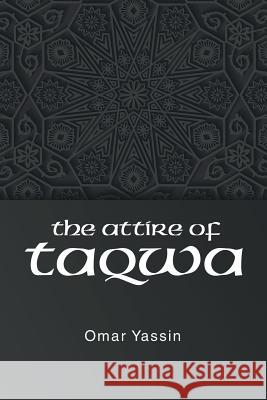The Attire of Taqwa » książka
The Attire of Taqwa
ISBN-13: 9781482864779 / Angielski / Miękka / 2016 / 328 str.
The Attire of Taqwa attempts to understand the question of taqwa in the Qur'an through the exploration of the Qur'anic speech that ignites its fire in the heart. To accomplish this, the book examines different Qur'anic topics pertinent to the issue of taqwa. It initially investigates the high frequency of this issue in the Qur'an and the reasons underlying it. The Attire of Taqwa also sheds light on the heart's central position in the Qur'an, its role in reflection, and its positive and negative influence on people's destinies in the Hereafter. This book, in addition, discusses the psychology of taqwa, based on particular Qur'anic messages that address and trigger specific human emotions fundamental to the development of taqwa. Further, the book explores the dynamic nature of taqwa and its positive effects on believers' lives today and their destinies on the Day of Judgment. Furthermore, it analyzes and discusses Luqman's advice, Ibad Al-Rahman's attributes, and the Qur'anic analogies in connection with the element of taqwa. It also reflects on the Qur'anic Question as a linguistic tool that Allah recurrently employs for effective delivery of His message to humankind. Finally, this work throws light on the Qur'anic stories--as a prominent Qur'anic phenomenon--that Allah employs to teach lessons of taqwa.
The Attire of Taqwa attempts to understand the question of taqwa in the Qur’an through the exploration of the Qur’anic speech that ignites its fire in the heart. To accomplish this, the book examines different Qur’anic topics pertinent to the issue of taqwa. It initially investigates the high frequency of this issue in the Qur’an and the reasons underlying it. The Attire of Taqwa also sheds light on the heart’s central position in the Qur’an, its role in reflection, and its positive and negative influence on people’s destinies in the Hereafter. This book, in addition, discusses the psychology of taqwa, based on particular Qur’anic messages that address and trigger specific human emotions fundamental to the development of taqwa. Further, the book explores the dynamic nature of taqwa and its positive effects on believers’ lives today and their destinies on the Day of Judgment. Furthermore, it analyzes and discusses Luqman’s advice, Ibad Al-Rahman’s attributes, and the Qur’anic analogies in connection with the element of taqwa. It also reflects on the Qur’anic Question as a linguistic tool that Allah recurrently employs for effective delivery of His message to humankind. Finally, this work throws light on the Qur’anic stories—as a prominent Qur’anic phenomenon—that Allah employs to teach lessons of taqwa.











